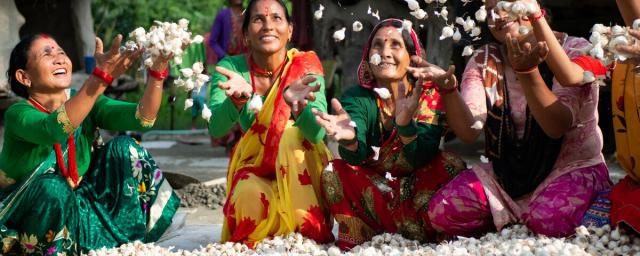
Members of a women’s group celebrate the success of their garlic project. Oxfam and partner NEEDS provided technical assistance for the project and supported the women’s group with trainings. The women have led efforts to reduce disaster risks and bring essential services to their community. (Photo: Elizabeth Stevens/Oxfam)
Nepal, officially the Federal Democratic Republic of Nepal, is a landlocked country in South Asia renowned for its beauty, from the towering Himalayas to lowland plains. It faces issues such as climate crisis and low incomes. Improvements have been made in education and health, and Oxfam is active in delivering programs that address issues such as disaster risk reduction and social justice.

Kabita Luhar drinking water at home. Kabita is a citizen scientist who has been advocating for access to water and other social issues in the community. (Photo: Kishor Sharma/Oxfam)
Challenges
Pressing challenges include low incomes, gender-based violence, and the effects of climate change. The country experiences over 3,000 climate-related disasters annually, impacting infrastructure and livelihoods. The major economic sector in Nepal is agriculture, which employs 60% of the labor force and adds roughly 23.9% to the country's GDP.
There are very low investments in agriculture and technology, though significant numbers of the population still depend on agriculture for livelihoods. Remittance (people from Nepal working out of country sending back money) is a significant foreign exchange source which accounts for around 25% of Nepal's GDP. Migration for employment remains a critical issue.
Impact on People
Many marginalized communities face heightened challenges due to systemic inequalities and environmental shocks. Women often bear the brunt of economic instability, taking on additional responsibilities in households while lacking access to resources and decision-making power.

Bimal Khatiwada from Oxfam (left), farmer Basanti Sunar (middle), and Ishwar Upadhyay of NEEDS (right) discuss the sugarcane crop in the village of Kutiya Kabar. Kutiya Kabar is situated between two rivers, and the frequency and intensity of floods is on the rise. Sunar, who is a leader in both a women’s group and her local disaster management committee, is spearheading efforts to introduce sugarcane as a flood-resistant cash crop. (Photo: Elizabeth Stevens/Oxfam)
Oxfam’s Role
Oxfam started operations in Nepal in the 1980s. We play a pivotal role through programs focused on gender equality, social justice, water, and climate resilience. Our priorities include supporting women leaders, enhancing community resilience against disasters, and advocating for inclusive policies. By fostering collaboration, we aim to create sustainable solutions that address both immediate needs and long-term development goals.
Our Work
Oxfam’s vision for Nepal is a just society without poverty, in which all women and men live a life of dignity, enjoy their rights and assume their responsibilities as active citizens of Nepal.

Yangjee Sherpa is a gardener at Multiple Nursery of Jaiwik Bibidhata Cooperative in Jorayal Rural Municipality of Doti district, Nepal. (Photo: Kishor Sharma/Oxfam)
Looking Ahead
To achieve further progress, we need investment in gender-responsive policies, improved access to resources for marginalized communities, and continued advocacy for women’s rights. Strengthening local governance structures and ensuring sustained funding for development initiatives will be crucial in building resilience and promoting equitable growth in Nepal.
